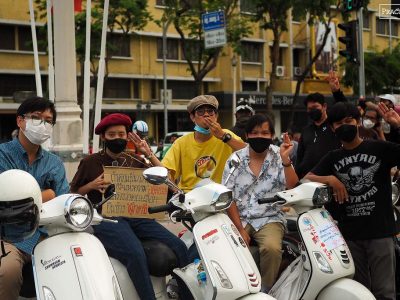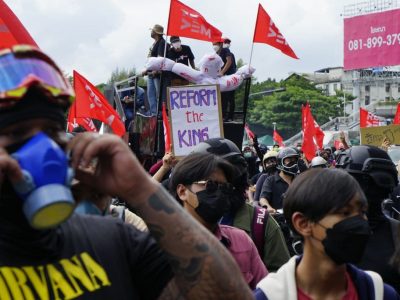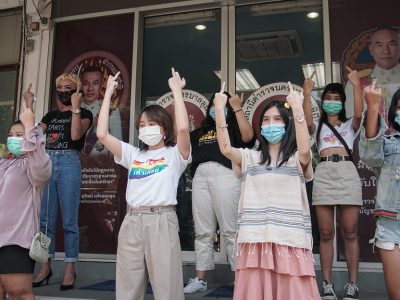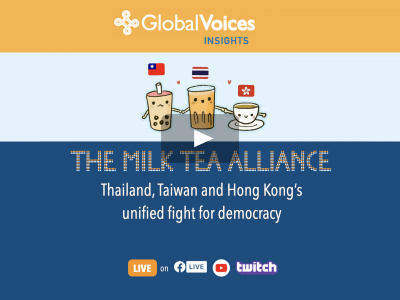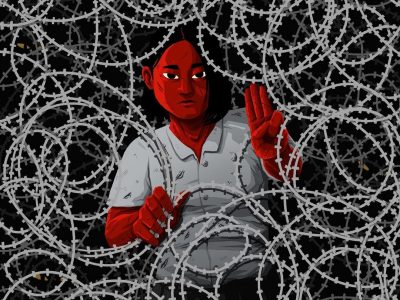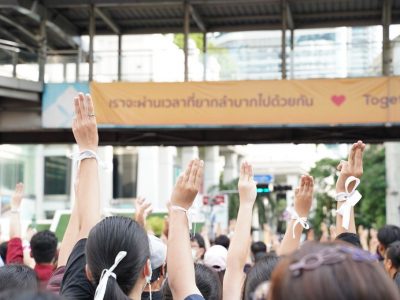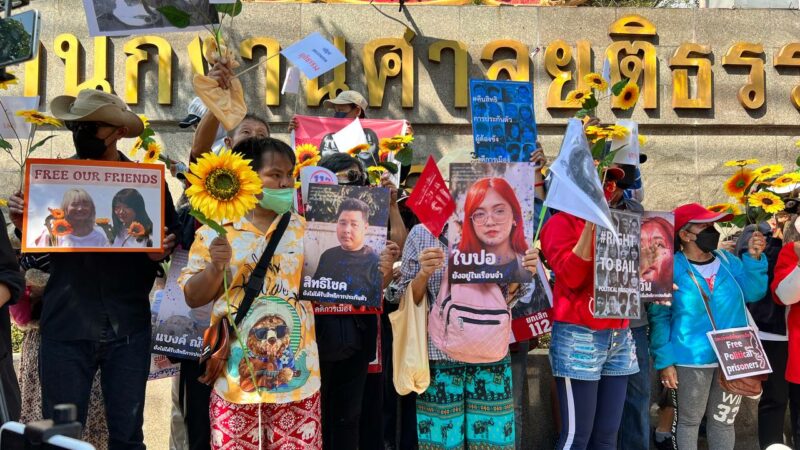
Protest in January 2023 in front of a criminal court demanding the release of political prisoners who were charged for ‘insulting’ the monarchy. The proposal to amend the royal defamation law has become an election issue and topic of political debates. Photo from Prachatai, a content partner of Global Voices
Thailand’s election on May 14 will be a contest between the forces that supported the 2014 coup and those who deem it necessary to pursue urgent democratic reforms in governance.
The army leader who led the 2014 coup is the incumbent Prime Minister and is seeking re-election. General Prayut Chan-o-cha headed the military-backed government which drafted the 2017 Constitution. He appointed 250 members of the Senate, who all chose him to become Prime Minister in the 2019 election.
The same system will be used to determine the country’s next leader. On May 14, voters will cast their ballots for the 500-member Parliament. The next Prime Minister needs at least 376 votes from the Parliament and the Senate. Prayut has the initial advantage because Senate members were his appointees. But Prayut is not assured of getting the absolute support of the Senate since his former Deputy Prime Minister is also a candidate.
The continuing strong influence of the military and royalist forces in the government is a major election issue. Another key issue is the impact of the youth-led protest movement, which called for democratic reforms in 2020. The latter is credited for popularizing the demand to review the controversial Section 112 of the Criminal Code or the Royal Defamation Law (lese Majeste). For several years, the government has weaponized the law to stifle dissent and silence critics.
READ MORE: Why are young people protesting in Thailand?
Global Voices extensively covered the 2014 coup, the rise of the pro-democracy movement, the campaign against Lese Majeste, the emergence of the student-led resistance in 2020, the crackdown during the pandemic, and the push for human rights protection during the ongoing election campaign.
Our coverage promotes the work of our media partners, Prachatai and EngageMedia, which offer independent reporting about the political situation in Thailand.
Several civil society groups have also initiated fact-checking activities and election-related platforms that track the campaign pledges of parties and candidates.
For additional context about the narratives related to Thai politics and elections, read the previous special coverage pages of Global Voices.
Stories about Thailand's 2023 election: Continuity or change?
Protests condemn military-appointed senators for ignoring the choice of Thai voters
Thai citizens took to the streets in protest over the last week after military-appointed senators refused to vote for Move Forward Party (MFP) candidate as the country’s next prime minister.
Trans woman MP designate advocates for a more gender-inclusive Thailand
Thailand's LGBTQ+ community made strides in the last election after three self-identified LGBTQ+ people won MP seats, including one trans woman who hopes to make the education system more inclusive.
Thailand swings toward democracy after landslide election victory
In Thailand's general election, the former opposition parties defeated the military-backed parties that have ruled the country since the 2014 coup and demonstrated their readiness to form a new government.
Understanding Thailand's upcoming election through political cartoons
Global Voices features several political cartoons that depict the major issues in Thailand's ongoing election campaign.
Election blunders continue during early voting in Thailand
Missing names, wrong ballot labels, and missing candidate profiles are among the problems voters and election watchdogs encountered during the early voting period in Thailand
Civil society groups share human rights agenda ahead of Thailand’s general election
"If these prosecutions are not terminated, it would be difficult to solve this deep-rooted political problem in Thailand."
Thailand election debate: Parties share stand on royal defamation law
Representatives of 10 political parties shared their positions on the controversial law which has been actively enforced to silence criticism supposedly in order to protect the monarchy.
Underscoring the challenges of promoting digital rights in Southeast Asia
"…information disorders have been weaponized for political gain, while oppressive governments have tried to control the internet, particularly through social media, and crackdown on dissidents using digital surveillance as tactic."
Thai political parties sign election code of conduct, pledge to uphold human and digital rights
"Political parties agreed that, regardless of who forms the government, it is crucial to work together to create stability, restore democracy, and promote economic development that leaves no one behind."
Thailand's upcoming general election is fundamentally flawed, say rights groups
HRW and over 50 Thai and international civil society groups highlighted the shrinking spaces for freedoms and democratic processes in Thailand in joint letters to 25 of Thailand’s democratic allies and trading partners.
Ahead of elections, Thai political parties commit to upholding digital rights
"Ahead of the upcoming elections in Thailand, political parties committed to recognising and incorporating the protection of digital rights in their agenda."
Thailand’s new ministerial decree could further suppress free speech online
The new decree is “another tool of control for the authorities to silence critical dissent, and a reflection of the digital dictatorship in Thailand.”
Thai protesters march against new non-profit organization bill
"The law is being used to silence us and stop us from gathering together. But we still come together in protest and are prepared for whatever charges that follow."
Thai protesters demand the abolition of royal defamation law
"We believe it would be better to live in a society where people are not imprisoned for simply expressing their political opinions, for demanding a better society..."
Protestors call for the resignation of Thailand's Prime Minister Gen Prayut
Since last year, protestors have been calling for the resignation of Prime Minister Gen Prayut who came to power through a coup in 2014.
Thailand protests against pandemic mismanagement met with police violence
Protesters have three demands: The resignation of the prime minister, the reallocation of the budget for the monarchy and military to COVID-19 assistance, and replacement of Sinovac with mRNA vaccines.
A young activist’s fight for gender equality and democracy in Thailand
"I think everyone should be a feminist, because if it’s a true democracy, the people should be supreme, and every person should be equal, no matter their gender or class."
WATCH: ‘The Milk Tea Alliance'—Thailand, Taiwan and Hong Kong's unified fight for democracy’
Missed the live-stream of the Global Voices Insights webinar on the "Milk Tea Alliance"? Here's a replay.
A digital artist depicts the lives of Thais and the struggle for democracy
"It’s time for us to rise up for a better future not just for ourselves, but also for the generations to come.”
Thai LGBTQ+ activists and pro-democracy protesters march together for equality
In Bangkok, LGBTQ activists join ranks with democracy protestors join to demand gender and marriage equality as well as political reforms of the monarchy.
Silencing the media won't stop the student-led protests in Thailand
"...while protesters rely mainly on media and other forms of communication to mobilize, these organizations have nothing to do with the students’ communication, coordination, and management of the protests."
















